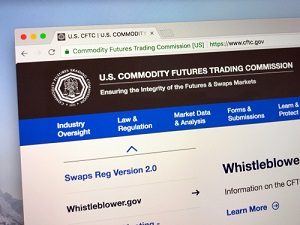CFTC Whistleblower Program Faces Challenges of its Success: What Whistleblowers Should Know

In May, 2021, the Wall Street Journal reported (paywall) on “turmoil” in the CFTC Whistleblower Program. According to the article, the CFTC has under consideration a whistleblower award based on a claim by a whistleblower in the 2015 $2.5 billion Deutsche Bank LIBOR manipulation settlement. Given the size of the Deutsche Bank settlement, the potential whistleblower award is substantial: the Journal reports that the CFTC is considering an award of $100 million. Such an award would eclipse the prior largest award made by the Commission, a $30 million award made in 2018, and nearly double the $120 million in awards made in the history of the program.
The Journal article is not, however, about the merits of the Deutsche Bank whistleblower’s claim. If that individual, who first approached the CFTC in 2012 and has waited an additional six years (so far) for an award determination since the Deutsche Bank settlement, voluntarily provided original information or analyses that led to successful enforcement actions, and met the procedural requirements of the CFTC Whistleblower Program, then Dodd-Frank and the CFTC Whistleblower Program rules are clear. Qualifying whistleblowers are mandated by Congress to receive awards between 10 and 30 percent of the monetary sanctions collected in a covered judicial or administrative action. So, what is the source of the turmoil?
How the CFTC Funds Whistleblower Awards
The challenge faced by the CFTC relates not to the merits of any particular award, however large, but to the source of funds for CFTC whistleblower awards, and the impact of a potential nine-figure whistleblower award. The CFTC pays whistleblower awards – $20 million in the last fiscal year – from the Commission’s Customer Protection Fund, which was created by the Dodd-Frank Act at the same time as the whistleblower program, and is funded by monetary sanctions collected by the CFTC in covered judicial or administrative actions to the extent those recoveries are not otherwise distributed to victims. The CFTC also uses monies in the Fund – about $5 million last year – to operate the Office of the Whistleblower and the Office of Customer Education and Outreach.
In its 2020 Annual Report, the CFTC reported a Customer Protection Fund balance of $117 million. A whistleblower award of $100 million would substantially deplete the Fund, especially if this fiscal year is otherwise like the last, with approximately $25 million required for other awards and expenses. If the Fund doesn’t have enough money to pay mandatory whistleblower awards, what happens?
The General Accounting Office has weighed in on this question, at the request of the CFTC. Last October, the GAO issued a report concluding that the CFTC must record whistleblower award obligations even if those awards exceed the CPF balance, noting that Congress explicitly barred the CFTC from considering the balance of the Fund when making whistleblower awards. Without adequate funds in the CPF, however, whistleblowers would be left with an IOU, as the GAO concluded that the CFTC would have “to await enactment of further appropriations sufficient to permit the CPF to satisfy its outstanding but unliquidated obligations.” And, a depleted Fund would also hinder the CFTC’s ability to process awards, as the CPF also funds the Office of the Whistleblower.
The Successes of the CFTC Whistleblower Program
 This situation is particularly frustrating given the success of the CFTC Whistleblower Program. According to the CFTC, enforcement actions associated with whistleblowers have resulted in sanctions orders totaling nearly $1 billion, and nearly 40% of the CFTC Enforcement Division’s ongoing investigations involve “some whistleblower component.” Just last week, the CFTC put out a new “Whistleblower Alert,” encouraging whistleblowers to report corrupt practices in the commodities and derivatives markets, including “actions that seek to improperly influence officials or agents with personal payments or rewards”
This situation is particularly frustrating given the success of the CFTC Whistleblower Program. According to the CFTC, enforcement actions associated with whistleblowers have resulted in sanctions orders totaling nearly $1 billion, and nearly 40% of the CFTC Enforcement Division’s ongoing investigations involve “some whistleblower component.” Just last week, the CFTC put out a new “Whistleblower Alert,” encouraging whistleblowers to report corrupt practices in the commodities and derivatives markets, including “actions that seek to improperly influence officials or agents with personal payments or rewards”
While enforcement has benefited from the courage of whistleblowers, and the CFTC does what it can to put out a welcoming message to whistleblowers, the CPF funding situation threatens the continued success of the CFTC Whistleblower Program. According to Senator Charles Grassley (R-Iowa), Commission staff have “temporarily paused review of some cases that could wipe out the Customer Protection Fund used to pay whistleblowers.” For whistleblowers who typically wait years for awards, being made to wait longer because of delays resulting from an under-resourced whistleblower office, or because of the need for congressional appropriations to cover mandatory awards, is manifestly unfair.
What can be done to ensure resources and funds are available to promptly pay CFTC whistleblower awards?
Legislative change can help. While the Customer Protection Fund is credited with monetary sanctions resulting from covered judicial or administrative actions, no such recovery can be credited to the Fund if the Fund’s balance exceeds $100 million. So, while the CFTC collects increasingly large sanctions – and therefore must make increasingly large whistleblower awards – its Fund remains stuck at a level that cannot meet those obligations. Senator Grassley, together with Sens. Maggie Hassan (D-N.H.), Joni Ernst (R-Iowa), and Tammy Baldwin (D-Wis.), introduced the CFTC Fund Management Act, which, as originally introduced, raised the fund cap to $150 million and temporarily establishes a separate account to house funds used to pay operating and programming expenses. (awards under the SEC Whistleblower Program are paid from an Investor Protection Fund created and funded in a similar manner. However, that fund is replenished if its balance falls below $300 million. The SEC has paid whistleblower awards in excess of $100 million)
Update July 6, 2021: The Senate and House passed the CFTC Fund Management Act, S. 409, and the bill became law with President Biden’s signature on July 6th. While S. 409 includes the creation of a $10 million account to fund the CFTC Whistleblower Program and related customer education initiatives, the increase to the fund cap was eliminated.
Assuring adequate funds for the operation of the CFTC Office of the Whistleblower is essential. However, Congress should also take steps to ensure that there are adequate funds for timely payment of CFTC whistleblower awards. While the public focus may currently be on the Deutsche Bank whistleblower, there is no doubt that any CPF shortages could affect other whistleblowers. Since the time of the Deutsche Bank settlement, the CFTC has recovered hundreds of millions in penalties from other banks for LIBOR manipulation violations, as well as from financial institutions charged with manipulation and spoofing in other commodities, futures, and derivative markets. Recoveries in those enforcement actions should be available to pay qualified whistleblowers.
What Whistleblowers Need to Know about the CFTC Fund Issue
 For those with information about wrongdoing in the commodities markets, the CFTC Whistleblower Program offers important benefits, including prohibitions on job retaliation and confidentiality protections for whistleblowers who report improper conduct. And, while timelines may be frustratingly long, Dodd-Frank and the CFTC Whistleblower Reward Program rules are clear that whistleblower awards are mandatory.
For those with information about wrongdoing in the commodities markets, the CFTC Whistleblower Program offers important benefits, including prohibitions on job retaliation and confidentiality protections for whistleblowers who report improper conduct. And, while timelines may be frustratingly long, Dodd-Frank and the CFTC Whistleblower Reward Program rules are clear that whistleblower awards are mandatory.
The “peril” reported by the Journal is real, but it should not impact a qualified whistleblower’s right to an award. It is reassuring that the GAO report emphasizes the mandatory nature of whistleblower rewards and that proposed legislative solutions focus on providing additional funds for the program.
However, the whistleblower process is not easy, and it can take years for cases to reach resolution. Whistleblowers must ensure that they have met all program requirements and presented their information and arguments in the most effective way possible. In determining the award, the CFTC will consider factors including:
- the significance of the information provided by the whistleblower in the success of the enforcement action;
- the assistance provided by the whistleblower and whistleblower’s counsel during the investigation;
- the timeliness of the whistleblower’s report to the Commission and the whistleblower’s use of internal reporting systems;
- whether the subject matter of the action is a Commission priority; and
- the degree to which an award encourages the submission of high-quality information from whistleblowers by appropriately rewarding whistleblower submissions of significant information and assistance.
Reporting an employer or other party can be a daunting task, and whistleblower attorneys are experienced in handling such cases with sensitivity. Experienced whistleblower attorneys can help evaluate evidence, effectively present information to government decision-makers, and provide effective assistance throughout any investigation, both to the government and to the whistleblower.
Read More:
- The CFTC Whistleblower Reward Program
- Markets regulated by the CFTC
- CFTC Enforcement Actions
- The Constantine Cannon Whistleblower Team
- Whistleblower FAQs
- Contact us for a confidential consultation
Tagged in: CFTC Whistleblower Reward Program, Financial and Investment Fraud, Fraud in CFTC-Regulated Markets, Importance of Whistleblowers,